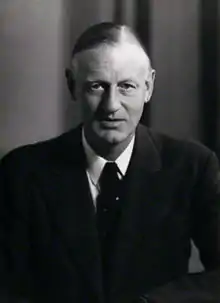Norman Brook, 1st Baron Normanbrook
Norman Craven Brook, 1st Baron Normanbrook, GCB, PC (29 April 1902 – 15 June 1967), known as Sir Norman Brook between 1946 and 1964, was a British civil servant. He was Cabinet Secretary between 1947 and 1962 as well as joint permanent secretary to HM Treasury and head of the Home Civil Service from 1956 to 1962.
The Lord Normanbrook | |
|---|---|
 Brook in 1951 | |
| Cabinet Secretary | |
| In office 1947–1962 | |
| Monarch | |
| Prime Minister | |
| Preceded by | Sir Edward Bridges |
| Succeeded by | Sir Burke Trend |
| Personal details | |
| Born | Norman Craven Brook 29 April 1902 |
| Died | 15 June 1967 (aged 65) |
| Spouse(s) | Ida Mary (m. 1929) |
| Alma mater | Wadham College, Oxford |
Background and education
Brook was the son of Frederick Charles Brook, of Bristol, and Annie, daughter of Thomas Smith. He was educated at Wolverhampton Grammar School and Wadham College, Oxford.[1]
Career
Brook joined the Home Civil Service in 1925 and attained the grade of Principal in 1933 and of Assistant Secretary in 1938. He was Principal Private Secretary to Sir John Anderson from 1938 to 1942, Deputy Secretary (Civil) to the War Cabinet in 1942, Permanent Secretary at the Ministry of Reconstruction from 1943 to 1945, Additional Secretary to the Cabinet from 1945 to 1946, and Secretary of the Cabinet from 1947 to 1962. He was also joint permanent secretary to HM Treasury and head of the Home Civil Service from 1956 to 1962.[1] Brook was appointed a Companion of the Order of the Bath (CB) in 1942, promoted to Knight Commander (KCB) in 1946[2] and Knight Grand Cross (GCB) in 1951,[3] and sworn of the Privy Council in 1953.
Churchill and Brook were colleagues during the Second World War and Churchill's 1951-1955 government. Brook was his adviser. Brook was a member of The Other Club. Brook succeeded Sir Edward Bridges as a secretary to the treasury in 1956. He served there to 1962.[4]
On 24 January 1963 he was raised to the peerage as Baron Normanbrook, of Chelsea in the County of London.[5][1] Between 1964 and 1967 he was Chairman of the Board of Governors of the BBC. He was one of the twelve pall bearers at Sir Winston Churchill's funeral in 1965.
Personal life
Lord Normanbrook married Ida Mary, daughter of E. A. Goshawk, in 1929. He died in June 1967, aged 65, when the barony became extinct.[1]
See also
- List of residents of Wolverhampton
References
- thepeerage.com Norman Craven Brook, 1st and last Baron Normanbrook
- "No. 37407". The London Gazette (Supplement). 1 January 1946. p. 6.
- "No. 39243". The London Gazette (Supplement). 7 June 1951. p. 3063.
- Wrigley, Chris (2002). Winston Churchill: A Biographical Companion. ABC-Clio. pp. 81–82.
- "No. 42903". The London Gazette. 25 January 1963. p. 793.
External links
- Bridges, Edward Ettingdene; The Other Club.
- Colville, John. 1981. The Churchillians.London:Weidenfeld and Nicolson.
- Gilbert Martin. 1983–1988. Winston S.Churchill.Vol.6-8.London:Heinemann.
- Seldon Abthony.1981.Churchill's Indian Summer. London:Hodder and Stoughton.
- Trend, Lord.1981."Brook, Norman Craven, Baron Normanbrook". In the Dictionary of National Biography 1961–1970, edited by E.T.Williams andC.S.Nicholls. Oxford:Oxford University Press.
| Political offices | ||
|---|---|---|
| Preceded by Sir Edward Bridges |
Cabinet Secretary 1947–1962 |
Succeeded by Sir Burke Trend |
| Preceded by Sir Edward Bridges |
Head of the Home Civil Service 1956-1962 |
Succeeded by Sir Laurence Helsby |
| Preceded by Sir Edward Bridges |
Permanent Secretary to the Treasury 1956-1962 With: Sir Roger Makins (1956-1959) Sir Frank Lee (1960-1962) |
Succeeded by Sir William Armstrong |
| Media offices | ||
| Preceded by Sir Arthur fforde |
Chairman of the BBC Board of Governors 1964–1967 |
Succeeded by Charles Hill |
| Peerage of the United Kingdom | ||
| New creation | Baron Normanbrook 1962–1967 |
Extinct |
.svg.png.webp)